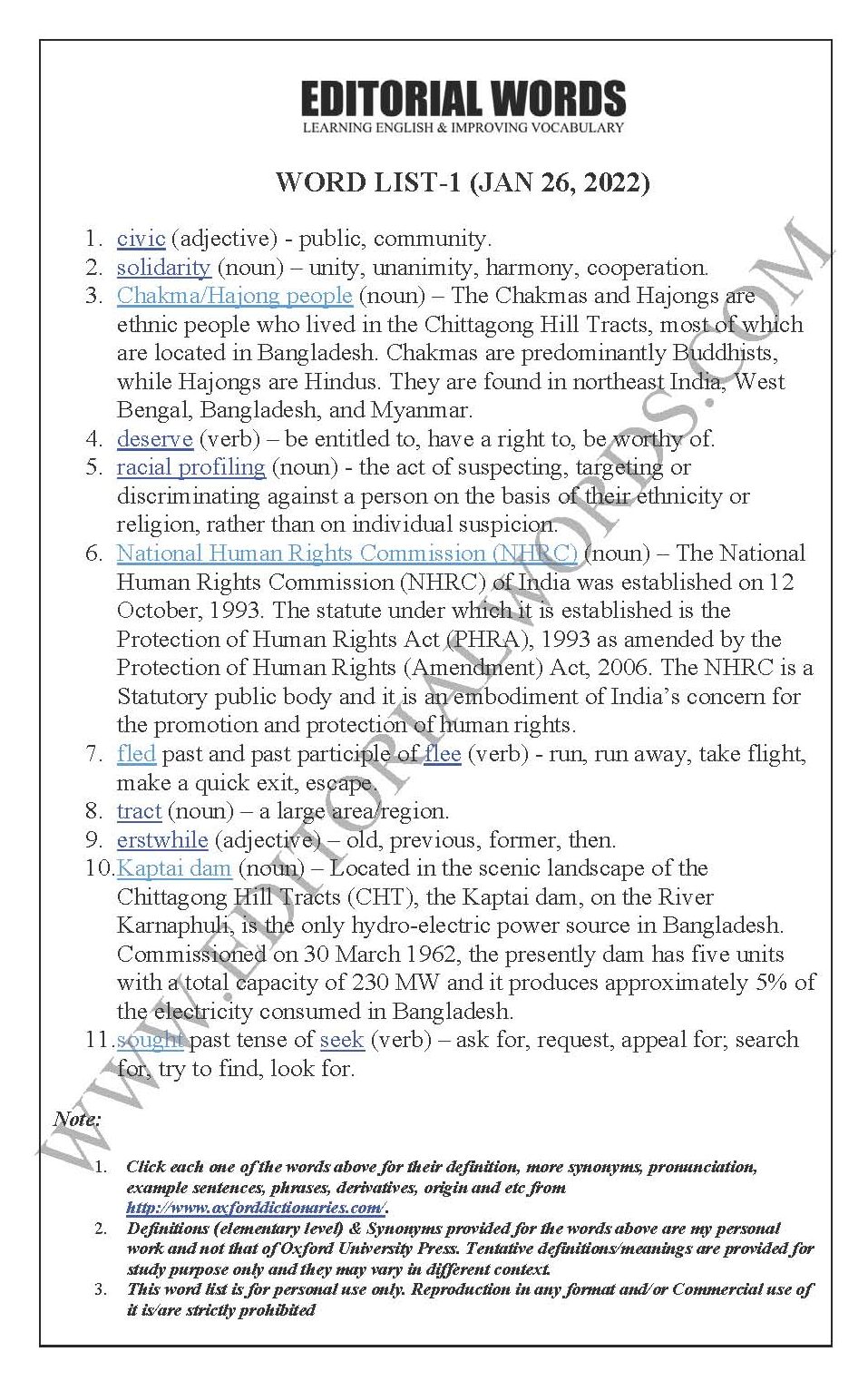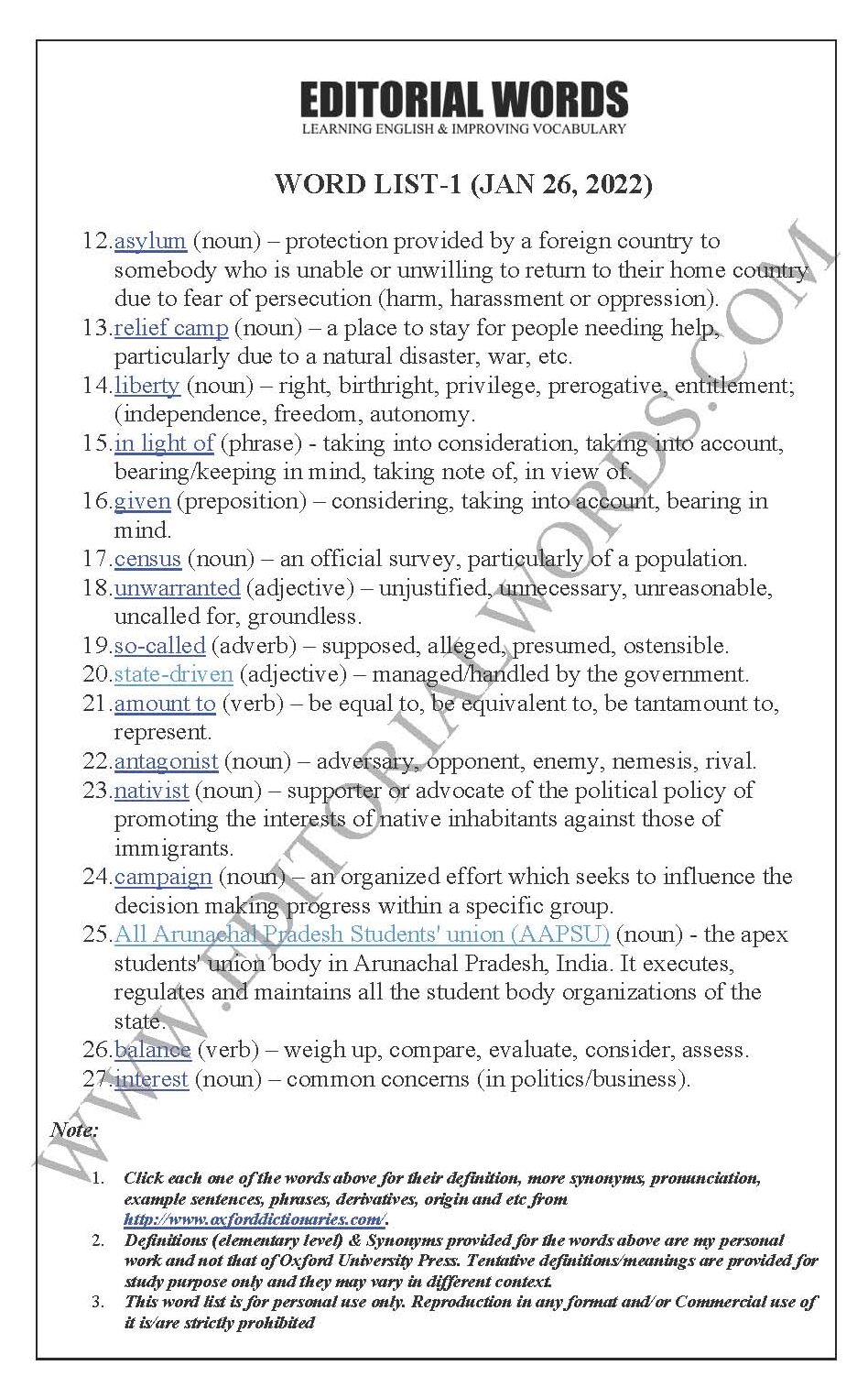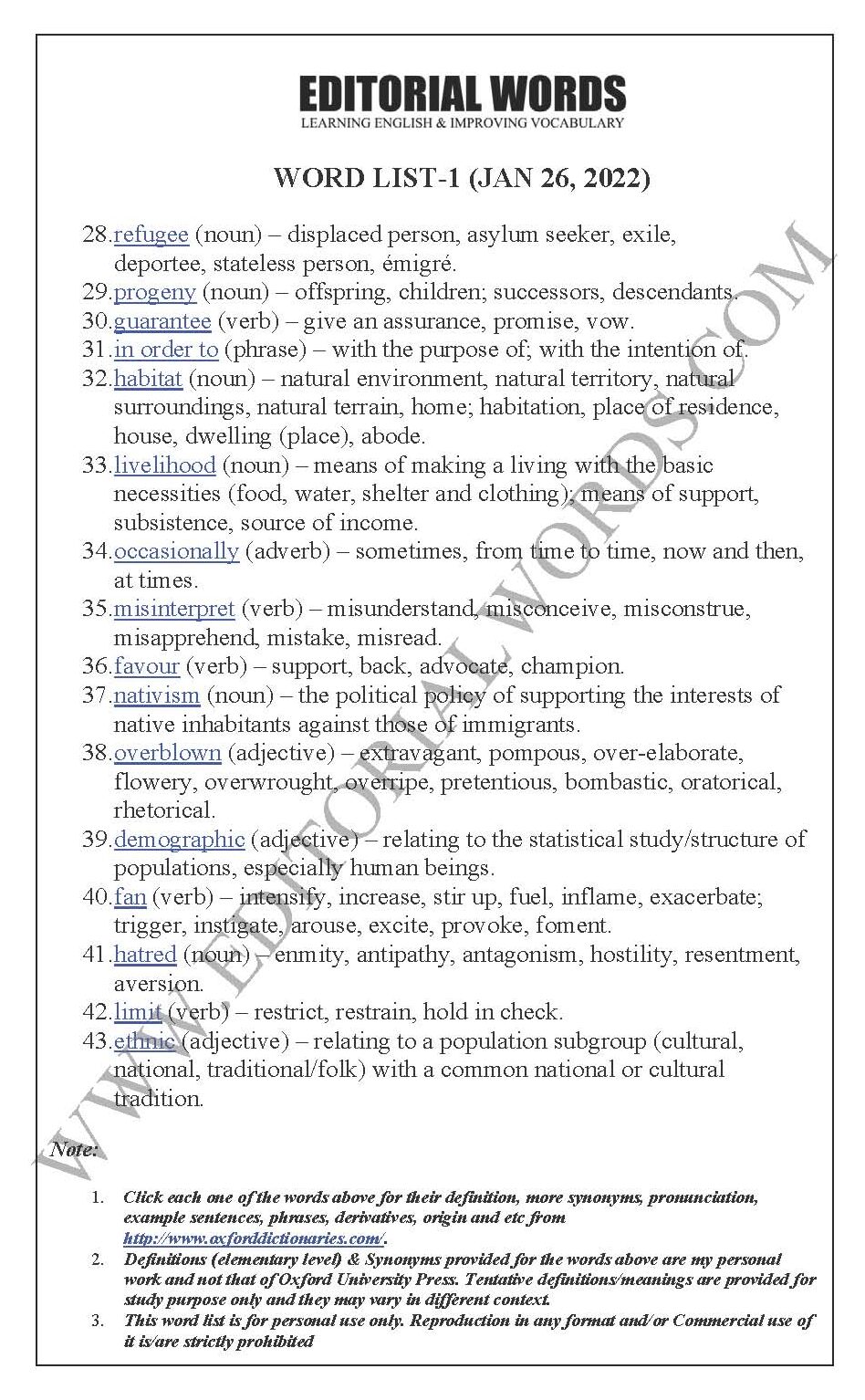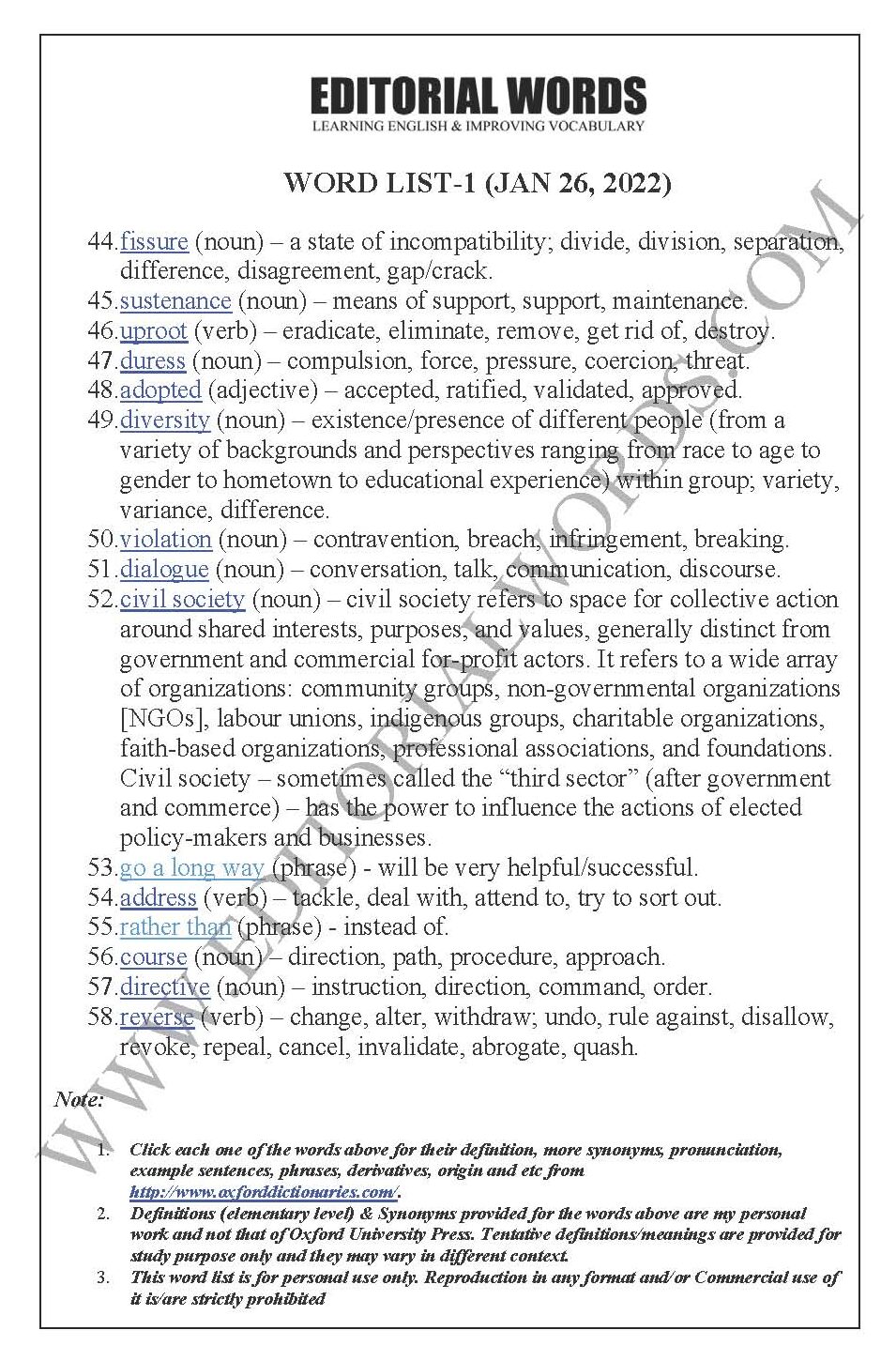The Hindu Editorial (For a civic solidarity) – Jan 26, 2022
The NHRC has done the right thing in directing the Ministry of Home Affairs and the Arunachal Pradesh government… For further reading, visit “The Hindu”. Below is today’s word list-1 for The Hindu Editorial (For a civic solidarity) – Jan 26, 2022.
To read this article, click “The Hindu”.
This preview is provided here with permission.
Courtesy: The Hindu
The Hindu Editorial (For a civic solidarity) – Jan 26, 2022:
- civic (adjective) – public, community.
- solidarity (noun) – unity, unanimity, harmony, cooperation.
- Chakma/Hajong people (noun) – The Chakmas and Hajongs are ethnic people who lived in the Chittagong Hill Tracts, most of which are located in Bangladesh. Chakmas are predominantly Buddhists, while Hajongs are Hindus. They are found in northeast India, West Bengal, Bangladesh, and Myanmar.
- deserve (verb) – be entitled to, have a right to, be worthy of.
- racial profiling (noun) – the act of suspecting, targeting or discriminating against a person on the basis of their ethnicity or religion, rather than on individual suspicion.
- National Human Rights Commission (NHRC) (noun) – The National Human Rights Commission (NHRC) of India was established on 12 October, 1993. The statute under which it is established is the Protection of Human Rights Act (PHRA), 1993 as amended by the Protection of Human Rights (Amendment) Act, 2006. The NHRC is a Statutory public body and it is an embodiment of India’s concern for the promotion and protection of human rights.
- fled past and past participle of flee (verb) – run, run away, take flight, make a quick exit, escape.
- tract (noun) – a large area/region.
- erstwhile (adjective) – old, previous, former, then.
- Kaptai dam (noun) – Located in the scenic landscape of the Chittagong Hill Tracts (CHT), the Kaptai dam, on the River Karnaphuli, is the only hydro-electric power source in Bangladesh. Commissioned on 30 March 1962, the presently dam has five units with a total capacity of 230 MW and it produces approximately 5% of the electricity consumed in Bangladesh.
- sought past tense of seek (verb) – ask for ,request, appeal for; search for, try to find, look for.
- asylum (noun) – protection provided by a foreign country to somebody who is unable or unwilling to return to their home country due to fear of persecution (harm, harassment or oppression).
- relief camp (noun) – a place to stay for people needing help, particularly due to a natural disaster, war, etc.
- liberty (noun) – right, birthright, privilege, prerogative, entitlement; (independence, freedom, autonomy.
- in light of (phrase) – taking into consideration, taking into account, bearing/keeping in mind, taking note of, in view of.
- given (preposition) – considering, taking into account, bearing in mind.
- census (noun) – an official survey, particularly of a population.
- unwarranted (adjective) – unjustified, unnecessary, unreasonable, uncalled for, groundless.
- so-called (adverb) – supposed, alleged, presumed, ostensible.
- state-driven (adjective) – managed/handled by the government.
- amount to (verb) – be equal to, be equivalent to, be tantamount to, represent.
- antagonist (noun) – adversary, opponent, enemy, nemesis, rival.
- nativist (noun) – supporter or advocate of the political policy of promoting the interests of native inhabitants against those of immigrants.
- campaign (noun) – an organized effort which seeks to influence the decision making progress within a specific group.
- All Arunachal Pradesh Students’ union (AAPSU) (noun) – the apex students’ union body in Arunachal Pradesh, India. It executes, regulates and maintains all the student body organizations of the state.
- balance (verb) – weigh up, compare, evaluate, consider, assess.
- interest (noun) – common concerns (in politics/business).
- refugee (noun) – displaced person, asylum seeker, exile, deportee, stateless person, émigré.
- progeny (noun) – offspring, children; successors, descendants.
- guarantee (verb) – give an assurance, promise, vow.
- in order to (phrase) – with the purpose of; with the intention of.
- habitat (noun) – natural environment, natural territory, natural surroundings, natural terrain, home; habitation, place of residence, house, dwelling (place), abode..
- livelihood (noun) – means of making a living with the basic necessities (food, water, shelter and clothing); means of support, subsistence, source of income.
- occasionally (adverb) – sometimes, from time to time, now and then, at times.
- misinterpret (verb) – misunderstand, misconceive, misconstrue, misapprehend, mistake, misread.
- favour (verb) – support, back, advocate, champion.
- nativism (noun) – the political policy of supporting the interests of native inhabitants against those of immigrants.
- overblown (adjective) – extravagant, pompous, over-elaborate, flowery, overwrought, overripe, pretentious, bombastic, oratorical, rhetorical.
- demographic (adjective) – relating to the statistical study/structure of populations, especially human beings.
- fan (verb) – intensify, increase, stir up, fuel, inflame, exacerbate; trigger, instigate, arouse, excite, provoke, foment.
- hatred (noun) – enmity, antipathy, antagonism, hostility, resentment, aversion.
- limit (verb) – restrict, restrain, hold in check.
- ethnic (adjective) – relating to a population subgroup (cultural, national, traditional/folk) with a common national or cultural tradition.
- fissure (noun) – a state of incompatibility; divide, division, separation, difference, disagreement, gap/crack.
- sustenance (noun) – means of support, support, maintenance.
- uproot (verb) – eradicate, eliminate, remove, get rid of, destroy.
- duress (noun) – compulsion, force, pressure, coercion, threat.
- adopted (adjective) – accepted, ratified, validated, approved.
- diversity (noun) – existence/presence of different people (from a variety of backgrounds and perspectives ranging from race to age to gender to hometown to educational experience) within group; variety, variance, difference.
- violation (noun) – contravention, breach, infringement, breaking.
- dialogue (noun) – conversation, talk, communication, discourse.
- civil society (noun) – civil society refers to space for collective action around shared interests, purposes, and values, generally distinct from government and commercial for-profit actors. It refers to a wide array of organizations: community groups, non-governmental organizations [NGOs], labour unions, indigenous groups, charitable organizations, faith-based organizations, professional associations, and foundations. Civil society – sometimes called the “third sector” (after government and commerce) – has the power to influence the actions of elected policy-makers and businesses.
- go a long way (phrase) – will be very helpful/successful.
- address (verb) – tackle, deal with, attend to, try to sort out.
- rather than (phrase) – instead of.
- course (noun) – direction, path, procedure, approach.
- directive (noun) – instruction, direction, command, order.
- reverse (verb) – change, alter, withdraw; undo, rule against, disallow, revoke, repeal, cancel, invalidate, abrogate, quash.
Note:
1. Click each one of the words above for their definition, more synonyms, pronunciation, example sentences, phrases, derivatives, origin and etc from http://www.oxforddictionaries.com/.
2. Definitions (elementary level) & Synonyms provided for the words above are my personal work and not that of Oxford University Press. Tentative definitions/meanings are provided for study purpose only and they may vary in a different context.
3. This word list is for personal use only. Reproduction in any format and/or Commercial use of it is/are strictly prohibited.
The Hindu Editorial (For a civic solidarity) – Jan 26, 2022:




“Phrasal Verbs” We Learnt Last Week
“Idioms & Phrases” We Learnt Last Week
“Important Definitions” We Learnt Last Week
Recent Word Lists For The Hindu Editorial Articles

Be the first to comment